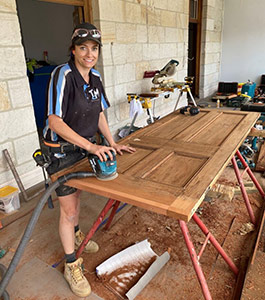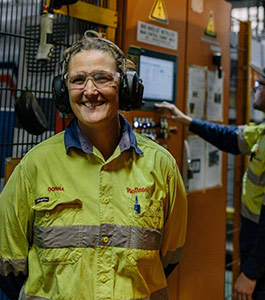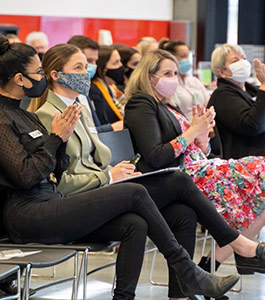As part of TWA’s Operation Protect and Preserve, designed to support apprentices and tradeswomen during COVID, we welcomed Programmed representatives Sam and Martin to share career tips and hints to our audience.
Sam has been working at Programmed for nine years now, and is with the HR team based in Melbourne, dedicated to working with and maintaining a truly healthy, safe and inclusive environment. Martin is a branch manager at Adelaide, passionate about getting young people into the workforce and find success.
Programmed is a leading provider of operations and maintenance services across all industry sectors including education, health, infrastructure, manufacturing, transport and mining in Australia and New Zealand. They have a large and diverse workforce, the composition of their workforce representative of their customers needs. Their values centre around promoting a safe working culture and being safety leaders, dedication to high quality work and customer serviced; wellness – caring, empathetic and respectful; promoting diversity and inclusion in all facets of their organisation.
Sam and Martin focused on providing great advice on creating the perfect application, preparing for interviews as well as how to become a successful candidate not only at Programmed but at any organisation.
Outstanding CV’s if You Have Little to No Work Experience
Martin recommended:
- Including a summary at the start of your CV
- Sell yourself, your talents, your qualities and keep to the point
- Ensure you tailor your CV to suit the job you’re going for and the industry you want to go into
- Outline your skills and/or “buzzwords”, align your experience with the requirements of the job
- Include a section on education and training accomplishments
- Include “hard and soft skills” – hard skills being your education experience, subjects that are pertinent to the skills required for the job, any experience you’ve gained at clubs/volunteering/etc); soft skills being your qualities (behaviours and personality) that address other requirements of the job, or make you stand out
- Include any extracurricular activities you’ve been involved with – leadership roles in a club or community organisation, times that you’ve mentored others, volunteered or been involved in community activities (these are looked on favourably)
- Instil throughout the application that you’re passionate about the job you’re going for
- Include any general interests or work experience you feel are pertinent to the job.
Preparing for an Interview and Interview Tips
You’ve got the call to attend an interview, so what next? Martin recommended to start preparing well in advance:
- Gather some intel about the business – check their website, get familiar with who the company is, what they do, how long they’ve been in operation, past and current projects, career opportunities, their values, mission and what they can offer you
- Take into account the employer will do a bit of prep on you too! They usually use social media channels to find out more about you – your ethics, morals and interests. Make sure your platforms are just right for an employer to check out
- Do a mock interview with a family or friend – get them to ask some usual interview questions to get more comfortable with the process
- At the end of most interviews an employer will give you the opportunity to ask questions about them and the company. Take advantage of this opportunity and think about 3-4 questions you’d like to ask them. Ask about the people interviewing you – their background, how long they’ve been at the company, what they like most about what they do, what they’re passionate about. Ask more about what the company does, recent projects, what career opportunities and progression can be offered. If you’re not confident you will remember the questions, write them down and take them with you.
- Before the day of the interview, make sure you know how you’re going to get there, when you need to leave, where you can park, etc, etc to ensure you have plenty of time to get to the meeting point for the interview
- Make sure you’re well groomed, well presented, looked after hygiene
- Turn off your mobile phone!
- Print out a couple of copies of your CV and supportive documents to take with you if you need to refer to them – it also gives you to opportunity to offer copies to the interviewers, showing that you’re super-prepared, creating a great impression
Leave a Lasting Impression
You only have a short amount of time to create an impression with the people that interview you, so make it count! Martin suggested:
- Conveying good manners throughout the interview
- Check that your body language is open (leave your legs and arms uncrossed) pay attention to what is being said, show interest and maintain a good level of eye contact with all parties interviewing you
- Avoid slang
- Use first names, but don’t abbreviate (ie: if your interviewer’s name is Rachael, don’t call them Rach)
- You might be nervous, but try and stay calm and collected, be confident – avoid telling everyone you’re nervous
- Show respect to your interviewers at all times
- Once the question is asked, it’s perfectly fine to let a couple of seconds go by silently while you gather your thoughts. Avoid mumbling, using filler words, etc
- If you’re completely stumped by a question and how to answer it, you can elect to answer it at the end of the interview (try and avoid this if you possibly can though). It is important that you perhaps write down the question or commit it to memory and take the initiative at the end of the interview to go back and answer it
- Instil enthusiasm and passion in your answers, be authentic in your compliments.
Consider traditional and behavioural questions that will be asked typically – think about how you can answer them to demonstrate your skills, experience, qualities align with the requirements of the job and as an employee showing the values of the organisation (ie: your ability to deal with conflict, dealing with customer complaints and creating a good result, your commitment to customer service as well as safety)
Please note that there are questions that might be asked of you which are unlawful – how old you are; whether you are married; whether you are planning to start a family soon
Once the interview is completed, keep the good manners up! Thank them for their time, for the interview experience, how excited you are about the opportunity and that you look forward to hearing from them about the position. Perhaps even let them know that you’re happy to develop particular skills that will assist in performing really well in the job; you’re keen on visiting some of their current and past projects to get to know the organisation better.
How the Employer Evaluates You
Martin confirmed that interviewees are assessed on skills and attributes only, not on personality or personal impressions, ensuring that the decision is unbiased. They will assess your experience and whether you are a good cultural fit. They will also consider those stand out items shown in your application, resume and throughout the interview.
Lastly, Martin stressed that each and every person in the audience should show that they are proud of who they are, their accomplishments, skills, experience, qualities, and to be authentic. He restated that it was important to be positive, courageous, be engaged and enthusiastic. While it’s hard to do so, it is important to “sell yourself” – talk yourself up, because you’re competing with others that will take this approach, so the interview was your time to shine.
The audience conveyed their thanks at the advice given, and were keen on asking a few questions of Martin and Sam:
Where do Programmed place job opportunities?
Sam and Martin confirmed:
- Programmed usually utilise Seek to advertise employment opportunities
- They also advertise through TWA and Work180
- They also utilise their organisation’s website (careers section)
- they also share on social platforms and blogs for upcoming opportunities
- Also take on recommendations from existing Programmed employees.
Sam confirmed that Programmed are partnered with quite a few other companies who may also have opportunities opening and new projects coming up. There were also opportunities to undertake voluntary work and work experience. If there weren’t any current opportunities available, send through an expression of interest, and call to find out of any opportunities coming up.
If an interviewer asks about starting a family, what is a safe way to deflect this question without it being negative?
Sam confirmed again that this question was unlawful and shouldn’t be asked at an interview. If it was asked, she recommended deflecting it by refocusing the conversation on the role, how passionate you are in pursuing a career, and your focus is on the position you’re being interviewed for.
Are there any roles Programmed are recruiting for at the moment?
Sam encouraged everyone to call Programmed to chat about opportunities, apprenticeship recruitment and keep their eyes on the job board. Martin confirmed that Programmed are involved in labour hire (casual hours) which could be an advantage in finding a full time role.
TWA encourage you to get in touch with Programmed today for opportunities to work with them – visit their careers site today – programmed.com.au .





